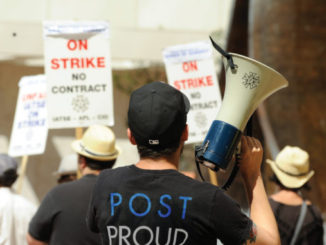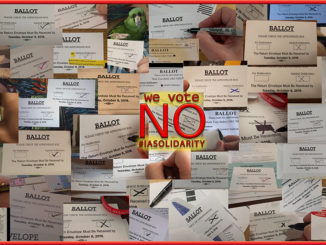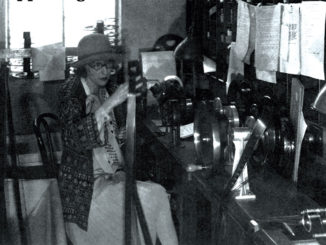
 By Kristin Marguerite Doidge
By Kristin Marguerite Doidge
It’s no secret that many Guild members are holding their breath these days.
The pandemic, followed by the dual WGA and SAG-AFTRA strikes, have left some of the hardworking pros in postproduction—in every classification and at any level — wondering when there will be better prospects, more work, and opportunities for growth. Some were trying to “survive until ’25,” while others are taking part-time jobs or cutting short films to get by.
 The Guild’s Eastern Region Membership Outreach Committee recently held an event to discuss possible solutions, and in addition to Guild-wide supportive efforts such as the Hardship Relief Fund and paid COBRA benefits, individual members and small groups have been working hard to help each other out.
The Guild’s Eastern Region Membership Outreach Committee recently held an event to discuss possible solutions, and in addition to Guild-wide supportive efforts such as the Hardship Relief Fund and paid COBRA benefits, individual members and small groups have been working hard to help each other out.
One thing that’s clear, though, is that the entertainment industry as a whole is facing a reckoning that’s far bigger than just delays from the strikes. Runaway production and postproduction are top of mind for the Guild, and laws that affect California and New York tax credits are of critical importance to help create and maintain union jobs.
With the November election now in the rearview mirror, how can members maintain hope while possibly preparing to be in limbo for the foreseeable future? What resources are available for those experiencing a slowdown in work, and how can those who are working support their colleagues? CineMontage spoke to a number of Guild members to find out.
HOW WOULD YOU DESCRIBE THE STATE OF THE INDUSTRY NOW?
 “Scary and transitional. I think we’re seeing a kind of whiplash from the job growth a few years ago when studios began to expand into streaming services. It seems like we are experiencing the bottom falling out of the ‘growth at all cost’ model of business where we saw a lot of movies and TV getting the greenlight for services that still aren’t making money. Those services are seeing a lot of internal restructuring and job cuts, and that is likely delaying the green light for movies even longer than it should have after the contracts were resolved. ”
“Scary and transitional. I think we’re seeing a kind of whiplash from the job growth a few years ago when studios began to expand into streaming services. It seems like we are experiencing the bottom falling out of the ‘growth at all cost’ model of business where we saw a lot of movies and TV getting the greenlight for services that still aren’t making money. Those services are seeing a lot of internal restructuring and job cuts, and that is likely delaying the green light for movies even longer than it should have after the contracts were resolved. ”
COREY JOHNSEN, ASSISTANT EDITOR AND VISUAL EFFECTS EDITOR, NEW YORK CITY
 “I think that the industry is starting to bounce back a bit since before the actor/writers strike, when we were at an all-time low of industry jobs and shows. We are definitely not back to the pre-strike era, and I don’t think we will ever get back to that point. I am hopeful that more shows and jobs will materialize soon or by the beginning of next year.”
“I think that the industry is starting to bounce back a bit since before the actor/writers strike, when we were at an all-time low of industry jobs and shows. We are definitely not back to the pre-strike era, and I don’t think we will ever get back to that point. I am hopeful that more shows and jobs will materialize soon or by the beginning of next year.”
LIBYA EL-AMIN, PICTURE EDITOR, LOS ANGELES
 “There’s a sizable portion of our members who are quietly working. Some have been working all along. They remain silent about it on social media to not ‘rub it in’ in front of others who aren’t working, because they understand the difficult times many are in. Some people call it ‘survivor’s guilt.’ I was at an editor mixer recently, and the mix of responses I got was either ‘I haven’t worked in x months (a long time),’ or ‘I’m drowning in work and barely made it to this mixer.’”
“There’s a sizable portion of our members who are quietly working. Some have been working all along. They remain silent about it on social media to not ‘rub it in’ in front of others who aren’t working, because they understand the difficult times many are in. Some people call it ‘survivor’s guilt.’ I was at an editor mixer recently, and the mix of responses I got was either ‘I haven’t worked in x months (a long time),’ or ‘I’m drowning in work and barely made it to this mixer.’”
SHIRAN CAROLYN MILLER, ACE PICTURE EDITOR, LOS ANGELES
HOW DOES IT COMPARE TO OTHER TIMES OF CRISIS/CONCERN?
 “I’ve been working professionally in the industry since 2003, and I’ve never seen anything like this. This work slowdown is much slower and has lasted way longer than any of the others I’ve experienced or seen. There hasn’t been a rebound since what seemed to have started with the strikes in 2023, and in fact, things seem to have gotten worse, not better.”
“I’ve been working professionally in the industry since 2003, and I’ve never seen anything like this. This work slowdown is much slower and has lasted way longer than any of the others I’ve experienced or seen. There hasn’t been a rebound since what seemed to have started with the strikes in 2023, and in fact, things seem to have gotten worse, not better.”
EMILY HSUAN, PICTURE EDITOR, LOS ANGELES
 “My wife has been basically unemployed for a year and half, I’ve only had a few months of work during the same period, and I’ve spoken to a lot of people who’ve had way less work than that. This slowdown is completely unprecedented; it doesn’t compare to any other time of crisis.”
“My wife has been basically unemployed for a year and half, I’ve only had a few months of work during the same period, and I’ve spoken to a lot of people who’ve had way less work than that. This slowdown is completely unprecedented; it doesn’t compare to any other time of crisis.”
BRIAN CHANDLER, UNSCRIPTED EDITOR, BURBANK
 “The only real consequential time this compares to was four years ago during COVID. Thankfully, I was on a show when everyone shut down, and within two months I was back to work and didn’t stop until mid-2023. It was full speed ahead with work coming everywhere on all angles, which allowed me to step into scripted narrative features. But this time is different.”
“The only real consequential time this compares to was four years ago during COVID. Thankfully, I was on a show when everyone shut down, and within two months I was back to work and didn’t stop until mid-2023. It was full speed ahead with work coming everywhere on all angles, which allowed me to step into scripted narrative features. But this time is different.”
MARK ANTHONY BESSLER, ASSISTANT PICTURE EDITOR, LOS ANGELES
 WHAT CAN GUILD MEMBERS DO TO HELP THEMSELVES RIGHT NOW?
WHAT CAN GUILD MEMBERS DO TO HELP THEMSELVES RIGHT NOW?
“Networking has always been the biggest factor for upward success in this business. The more you get out and speak with others, the better chance you will meet the right person who could change your career. I have a lot of great mentors and thank them for letting me annoy them with my never-ending questions. I have been reaching out to people to grab coffee/lunch. We lost so much interaction with the pandemic, and one thing that I miss is the social interaction and mingling. Keep talking to one another because that’s all we have at the end, is each other.”
MARK ANTHONY BESSLER, ASSISTANT PICTURE EDITOR, LOS ANGELES
“I got very frustrated during and after the strike when I couldn’t get work in TV at all. I took a super micro-budget feature that I normally would not have been interested in, but it led to my next feature and the one after that… So I’d say, don’t be afraid to try something new.”
LIBYA EL-AMIN, PICTURE EDITOR, LOS ANGELES
“I do think it’s difficult, but necessary, to look outside one’s normal box of work opportunities/types of work and explore other opportunities—corporate work (editing), for example, or even trying to do something completely different. And taking care of one’s emotional and mental health is very important during this time.”
EMILY HSUAN, PICTURE EDITOR, LOS ANGELES
“I think it’s a good time for people to learn a new technology or learn a new program. Read up on AI and broaden your skill set. Get ready for that next opportunity, because once the work comes, it’s all going to come at once.” SHANNON BAKER DAVIS, ACE, PICTURE EDITOR, LOS ANGELES
 HOW CAN MEMBERS HELP EACH OTHER?
HOW CAN MEMBERS HELP EACH OTHER?
“I think members can help each other best if they hear of jobs and recommend their peers. Also, if they are working and feel comfortable, they should reach out to former employers they perhaps know who are staffing and forward resumes and recommendations.”
EMILY HSUAN, PICTURE EDITOR, LOS ANGELES
“If you have the ability, I think the most important way to stay busy is to volunteer. In the last year and a half, I cut four videos for IATSE and two for MPEG. In fact, I recently joined the Member Outreach Committee, and as I write this email, I’ve been cutting a ‘Ghostbusters’ parody music video for the Guild about the importance of asking your field rep when you need help.”
BRIAN CHANDLER, UNSCRIPTED PICTURE EDITOR, BURBANK
“We [music editors] try to help each other with temp music and also work together to share new technology. Someone will say ‘use this program or plugin’ or ‘this video conversion software doesn’t work anymore,’ and we stay in contact and just check in with each other.”
JILLINDA PALMER, MUSIC EDITOR, LOS ANGELES
 “My experience in New York might be different than the average LA member, but I’ve always understood that looking for work multiple times a year and doing a lot of personal outreach is a big part of this job, so
“My experience in New York might be different than the average LA member, but I’ve always understood that looking for work multiple times a year and doing a lot of personal outreach is a big part of this job, so
I think people can help each other keep that muscle strong and keep others’ situations in mind if they’re ever in a position to influence hiring. Mutual aid can also be very helpful if people are in a tight spot, and I think taking that mindset into other arenas could help a lot.”
ALAN WERTZ, ASSISTANT PICTURE EDITOR, NEW YORK CITY
“For those who are comfortable financially and looking to help, consider taking a few days off and arranging for
a fill-in by someone with relevant experience who needs their last few hours to qualify for healthcare. A day or two off could mean six months of healthcare for a whole family. You can go here to see who needs hours and check out their resumes: https://www.editorsguild.com/Member-to-Member/MPI-Hours-Alert. Otherwise, people should donate to our Hardship Relief Fund that, so far, has helped over 100 members in need!”
SHIRAN CAROLYN MILLER, ACE PICTURE EDITOR, LOS ANGELES
“I saw a thread in a Facebook MPEG group that mentioned the idea of taking vacations so that members who need hours can fill in. I understand that idea feels a little dystopic and not ideal, but our insurance issues are beyond an IATSE issue and affect our entire country, so any idea that helps someone struggling is a good idea.”
COREY JOHNSEN, ASSISTANT EDITOR AND VISUAL EFFECTS EDITOR, NEW YORK CITY
 RESOURCES & MORE INFORMATION FOR MEMBERS
RESOURCES & MORE INFORMATION FOR MEMBERS
Review MPEG’s stress survival kit: https://www.editorsguild. com/Stress-Survival-Kit to learn about dues waivers, alternative healthcare options, and how to apply for (or contribute to) the Hardship Relief Fund.
To help out a fellow struggling member directly, you can sign up for Aid IA, the mutual aid effort founded by three MPEG members: https://sites.google. com/view/aid-ia.
Reel Wellness: Learn how to make time to care for your mind and body. Check out training seminars on a variety of topics from Entertainment.
Community Services: https://entertainmentcommunity.org/services-and-programs/enrich-your-career. Watch/listen to a recorded presentation on what to do when MPI healthcare runs out. Visit the Guild’s “Labor to the Polls” website to learn more about labor-endorsed candidates and to find other helpful resources related to advocacy for campaigns that support IATSE’s mission to support union postproduction jobs.





